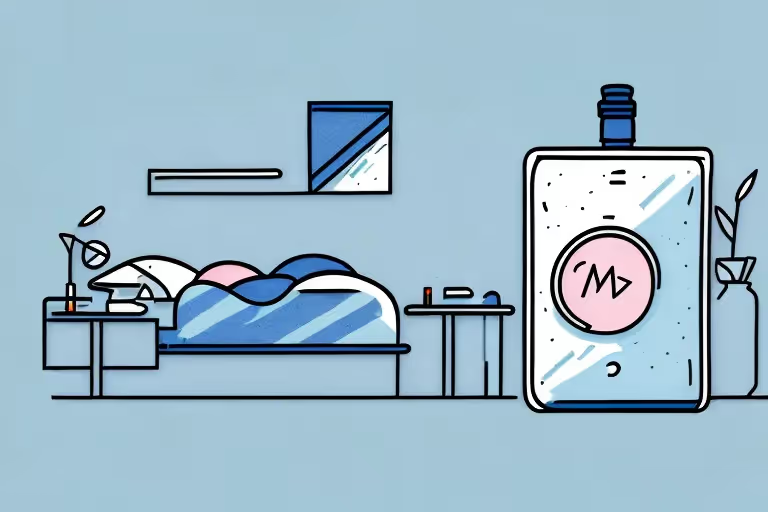Welcome, my night-owl friend, to a playful romp through the scientific world of sleep. Are you someone who yearns for the ever-elusive sleep? Say hello to your new pals, Trazodone and Melatonin, who might just be the sheep you need to count tonight.
Understanding Sleep Quality
Before we dive deeper into the matter, let's take a moment to understand what we mean by 'Sleep Quality'. Sleep isn't just about conking out on your pillow and waking up when the alarm yells. It's a pretty complex process!
When we talk about sleep quality, we're referring to the overall effectiveness and restfulness of your sleep. It's not just about the duration, but also about how well you sleep and how refreshed you feel upon waking up. Achieving good sleep quality is essential for maintaining optimal physical and mental health.
Ever heard of the circles under your eyes and your cloudy brain begging for just '5 more minutes'? That's your body demanding quality sleep. Those dark circles are a visible sign of sleep deprivation, and that foggy brain is a clear indication that your sleep quality needs improvement.
Listen Now: Get the Best Selection of Deep Sleep Music & Tracks in the Aura App
Try it Free!
The Importance of Good Sleep
You might sometimes question, 'Is quality sleep really that important?'. Resounding yes! Sleep isn’t the cousin we ignore at family reunions; it’s the party planner, the one making sure everything is running smoothly. Without good sleep, we'd be walking zombies.
Quality sleep is crucial for various aspects of our well-being. It plays a vital role in maintaining a healthy immune system, regulating hormones, supporting cognitive function, and promoting emotional well-being. When we consistently get good sleep, we enhance our ability to concentrate, make better decisions, and manage stress effectively.
And trust me, you don't want to be a zombie. Ever seen the movies? Not a pretty sight. Lack of sleep can lead to a range of negative effects, including fatigue, irritability, decreased productivity, impaired memory, and even an increased risk of chronic health conditions such as obesity, diabetes, and cardiovascular disease.
Factors Affecting Sleep Quality
But you know, Zzzs are elusive. Numerous factors are the culprits, like your diet, your stress levels, your bedtime routine, and even your bedroom environment. It's high time we wage war on these factors and reclaim our dreamland. Join me, will you?
Let's start by examining the impact of diet on sleep quality. Consuming excessive amounts of caffeine, especially close to bedtime, can disrupt your sleep patterns. Similarly, heavy meals or spicy foods can cause discomfort and make it harder to fall asleep. On the other hand, incorporating sleep-friendly foods like bananas, almonds, and herbal teas can promote better sleep.
Stress is another major factor that can significantly affect sleep quality. When we're stressed, our minds tend to race, making it difficult to relax and fall asleep. Developing effective stress management techniques, such as practicing mindfulness or engaging in relaxation exercises, can help reduce stress levels and improve sleep.
Your bedtime routine also plays a crucial role in determining the quality of your sleep. Establishing a consistent bedtime routine signals to your body that it's time to wind down and prepare for sleep. This can include activities such as reading a book, taking a warm bath, or practicing gentle stretching exercises. Creating a calm and relaxing environment in your bedroom, with dim lighting and a comfortable mattress, can further enhance sleep quality.
But sometimes, despite our best efforts, we may still struggle to achieve good sleep quality. That's where sleep aids like Trazodone and Melatonin come into play. Trazodone is a medication often prescribed for insomnia, while Melatonin is a hormone that helps regulate sleep-wake cycles. These sleep aids can be useful in certain situations, but it's important to consult with a healthcare professional before using them.
So, let's embark on this journey together and prioritize our sleep quality. By understanding the importance of good sleep, identifying the factors that affect it, and exploring potential solutions, we can pave the way for restful nights and energized days. Remember, quality sleep is not a luxury; it's a necessity for a healthy and fulfilling life.
An Overview of Trazodone
Trazodone, sounds fancy? It's an antidepressant medication, my dear friend. It is used to treat depressive persons and for their sleep problems.
Wait! We are not promoting it, but just introducing. Always consult doctors before using it.
Trazodone, the magical sleep aid that holds the power to transform restless nights into peaceful slumbers. This wonder drug is not just your average antidepressant; it is a VIP guest at your sleep party, the bouncer who keeps the rowdy, pesky thoughts out!
What is Trazodone?
Trazodone is a medication that knocks on your brain's door and helps you lullaby into sleep. But how does it achieve this remarkable feat? Let's delve into the fascinating world of Trazodone and uncover its secrets.
Imagine your brain as a bustling city, with neurotransmitters acting as messengers, delivering important signals to maintain harmony and balance. However, in individuals suffering from depression, this delicate equilibrium is disrupted, leading to a cascade of negative emotions and sleep disturbances.
This is where Trazodone steps in as the hero of the story. It joins the party by reestablishing the balance of certain natural chemicals, particularly serotonin, in the brain. Serotonin, often referred to as the "feel-good" neurotransmitter, plays a crucial role in regulating mood, sleep, and overall well-being.
By increasing the levels of serotonin in the brain, Trazodone creates an overall feeling of wellbeing and happiness during the day. But its true superpower lies in its ability to help your body relax when night falls, leading to a peaceful night's sleep.
Think of Trazodone as the star player in your sleep team, working tirelessly to ensure that you wake up refreshed and rejuvenated each morning.
How Does Trazodone Work?
Now, pull up your nerdy glasses and let’s delve a bit deeper into the big question: How does Trazodone work its magic?
As mentioned earlier, Trazodone primarily works by increasing the levels of serotonin in your brain. But what does this mean for your sleep journey?
Picture yourself on a warm, sunny day, surrounded by a beautiful garden filled with blooming flowers. The scent of lavender fills the air, instantly calming your senses. This is the kind of tranquility that Trazodone aims to create within your brain.
By boosting serotonin levels, Trazodone helps to create a sense of calm and relaxation, preparing your body for a restful night's sleep. It acts as a gentle lullaby, soothing your racing thoughts and guiding you into the peaceful realm of dreams.
However, it's important to remember that sleep is a team sport. While Trazodone may be the star player, it works best when combined with healthy sleep habits and a conducive sleep environment. So, make sure to create a cozy sanctuary for your slumber, free from distractions and filled with comfort.
So, the next time you find yourself tossing and turning, unable to find solace in the arms of sleep, remember that Trazodone is there, ready to lend a helping hand. With its serotonin-boosting powers, it can be the key to unlocking a world of restful nights and energized mornings.
The Impact of Trazodone on Sleep
Trazodone and Sleep Duration
Imagine a cherubic Trazodone singing you sleep lullabies while gently caressing your brain cells. Cute, right? Essentially, Trazodone increases your sleep duration by extending the time you spend in both the REM and non-REM stages of sleep.
Let's dive deeper into the fascinating world of Trazodone and its impact on sleep duration. When you take Trazodone, it acts on certain receptors in your brain, promoting the release of neurotransmitters that regulate sleep. These neurotransmitters help to synchronize your sleep-wake cycle, ensuring that you get the optimal amount of restful sleep.
As Trazodone takes effect, it gently guides you into a state of relaxation, allowing your body and mind to unwind from the day's activities. It slows down the firing of neurons in your brain, creating a soothing environment conducive to sleep. This gradual transition into sleep helps to extend the duration of both REM and non-REM sleep stages, allowing you to experience a more restorative and rejuvenating slumber.
So, with Trazodone as your sleep companion, you can bid farewell to those restless nights and embrace the blissful embrace of a prolonged and satisfying sleep.
Stay tuned! In the next episodes, we will reveal its connection to sleep quality...
Trazodone and Sleep Quality
Okay, the finale of Trazodone: it helps increase overall sleep quality! Now, that’s an encore performance we can get behind. By extending the sleep phase, Trazodone facilitates deep sleep, meaning better quality sleep for you. It's like having a good quality mattress.
Let's delve into the intricate mechanisms through which Trazodone enhances sleep quality. As you drift off into the land of dreams, Trazodone works its magic on your brain chemistry. It interacts with specific neurotransmitters, such as serotonin, which play a crucial role in regulating mood and sleep. By modulating the activity of these neurotransmitters, Trazodone helps to create a more stable and harmonious sleep pattern.
But that's not all! Trazodone also has a sedative effect, inducing a feeling of tranquility and calmness. This sedation not only helps you fall asleep faster but also promotes a deeper and more uninterrupted slumber. It's like being wrapped in a cozy blanket of relaxation, ensuring that you wake up feeling refreshed and revitalized.
So, with Trazodone as your sleep gladiator, you can conquer those restless nights and embrace the joys of a truly restful sleep. Say goodbye to tossing and turning, and hello to nights filled with peaceful dreams and mornings brimming with energy.
An Overview of Melatonin
And in our other corner, the natural star of our sleep show: Melatonin. It's your body's sleep hormone, a crucial part for maintaining our sleep-wake cycle.
But what exactly is Melatonin and how does it work? Let's dive deeper into this fascinating hormone.
What is Melatonin?
Think of Melatonin as the diligent clock-ticker inside of your body that keeps time for your internal body processes. It's the maestro of your biological orchestra, paving the way for you to fall asleep smoothly.
But Melatonin is not just a sleep hormone. It's a multitasker! Besides regulating sleep, Melatonin also plays a role in various other physiological functions such as immune system regulation and antioxidant activity. It's like a superhero hormone, fighting off free radicals and keeping your body in balance.
So, how does Melatonin actually work its magic? Let's find out!
How Does Melatonin Work?
The Melatonin mechanism is a beautiful symphony. As night falls and darkness engulfs your surroundings, your body ramps up the production of Melatonin, signalling your body to prepare for dreamland. It's like a gentle lullaby, coaxing you into a peaceful slumber.
But how does darkness trigger the release of Melatonin? Well, it all starts with a tiny gland nestled deep in your brain called the pineal gland. This remarkable gland is responsible for producing and releasing Melatonin into your bloodstream.
When darkness sets in, the pineal gland receives signals from your eyes, specifically the absence of light. This triggers a series of chemical reactions that ultimately lead to the production of Melatonin. It's like a secret code that only darkness can decipher.
Once Melatonin is released into your bloodstream, it travels throughout your body, spreading its sleep-inducing magic. It acts on specific receptors in your brain, helping to regulate your sleep-wake cycle and promote a deep, restful sleep.
But Melatonin is not just a night owl hormone. It also knows when it's time to bid farewell. As daylight breaks, Melatonin levels drop, signalling your body to wake up and embrace the new day.
It's truly a nifty little system, isn't it? The way Melatonin dances with darkness and light, orchestrating your sleep-wake cycle with precision and grace.
So, the next time you drift off into dreamland, remember to thank Melatonin for its tireless efforts in ensuring you get a good night's sleep.
The Impact of Melatonin on Sleep
Sleep is a vital aspect of our lives, and anything that can help improve our sleep is worth exploring. One such sleep aid that has gained popularity in recent years is melatonin. Melatonin is a hormone produced naturally by the pineal gland in the brain, and it plays a crucial role in regulating our sleep-wake cycle.
Melatonin and Sleep Duration
But how does this all translate into actual sleep? Well, increased levels of melatonin can extend your sleep duration. Your body can recognize that it's time to sleep longer, granting you more time in dreamland. Imagine having that extra hour of sleep that leaves you feeling refreshed and energized for the day ahead. Melatonin can make that possible.
Not only does melatonin help you fall asleep faster, but it also helps you stay asleep for longer periods. This means fewer interruptions during the night and a more restful sleep overall. With melatonin on your side, you can bid farewell to those nights of tossing and turning.
But wait, the conductor has yet to strike the final note...
Melatonin and Sleep Quality
More importantly, apart from sleep duration, melatonin also improves sleep quality. This gentle conductor doesn’t just keep time; it ensures the sleeping part of our life is kept in beautiful harmony. When melatonin levels are optimal, you are more likely to experience deep, restorative sleep.
During deep sleep, your body undergoes essential processes such as tissue repair, muscle growth, and immune system strengthening. It is during this phase that your brain consolidates memories and processes emotions, contributing to cognitive function and emotional well-being. With melatonin enhancing your sleep quality, you can wake up feeling rejuvenated and ready to take on the day.
Take a bow, Melatonin! Thanks to this remarkable hormone, we can enjoy not just longer sleep, but also better sleep. So, the next time you find yourself struggling to fall asleep or waking up feeling groggy, consider giving melatonin a try. Your body and mind will thank you for it.
Comparing Trazodone and Melatonin
Effectiveness of Trazodone vs. Melatonin
So who's the ultimate champion? Well, it's more of a draw. Both Trazodone and Melatonin are effective sleep aids in their ways, but remember, everyone's sleep is as unique as their fingerprint, and what works best for you might be different.
Whether you root for Team Trazodone or Team Melatonin will depend on your own body and its needs.
Side Effects of Trazodone and Melatonin
Now, the catch in the tale: Side effects! Always remember, the key is moderation. Overuse of Trazodone can lead to dizziness, headache & muscles ache, while excess Melatonin can lead to stomach discomfort, mild depression, and even daytime drowsiness. Always consult a healthcare professional before adding these guys to your routine.
You can’t sprint yourself to quality sleep overnight!
Conclusion: Trazodone and Melatonin in Sleep Improvement
Choosing Between Trazodone and Melatonin
The moral of our story? Both Trazodone and Melatonin can be faithful sleep allies. Ultimately, the choice between them relies on your unique sleep conditions and, of course, the advice of your healthcare professional. Make an informed decision and allow them to serve you sweet dreams on a platter!
Future Research Directions
More research is needed to further reveal the hidden potentials and mysteries linked to both Trazodone and Melatonin. Our understanding of the sleep world is continuously evolving, like a sleepwalker navigating an enigmatic dream. We look forward to what the future of sleep science will unveil!
Now, before we wrap up, let’s have a little sneak peek into a wonderful world that connects you to peace, relaxation, and yes, better sleep - the Aura Health App. Featured as one of the best sleep apps in 2021, Aura is a platform curated to better understand and improve your sleep health. With personalized sleep insights and guided content, Aura Health is your personal sleep assistant, helping you drift off into a peaceful slumber in perfect harmony.
So, here's hoping for better nights and fresher mornings to you, my friend! Goodnight, and...sweet dreams!
Listen Now: Get the Best Selection of Deep Sleep Music & Tracks in the Aura App



.webp)






.avif)

%20(1).avif)


.avif)
.avif)
.webp)


.avif)


















































































































.avif)

















.svg)





.avif)



